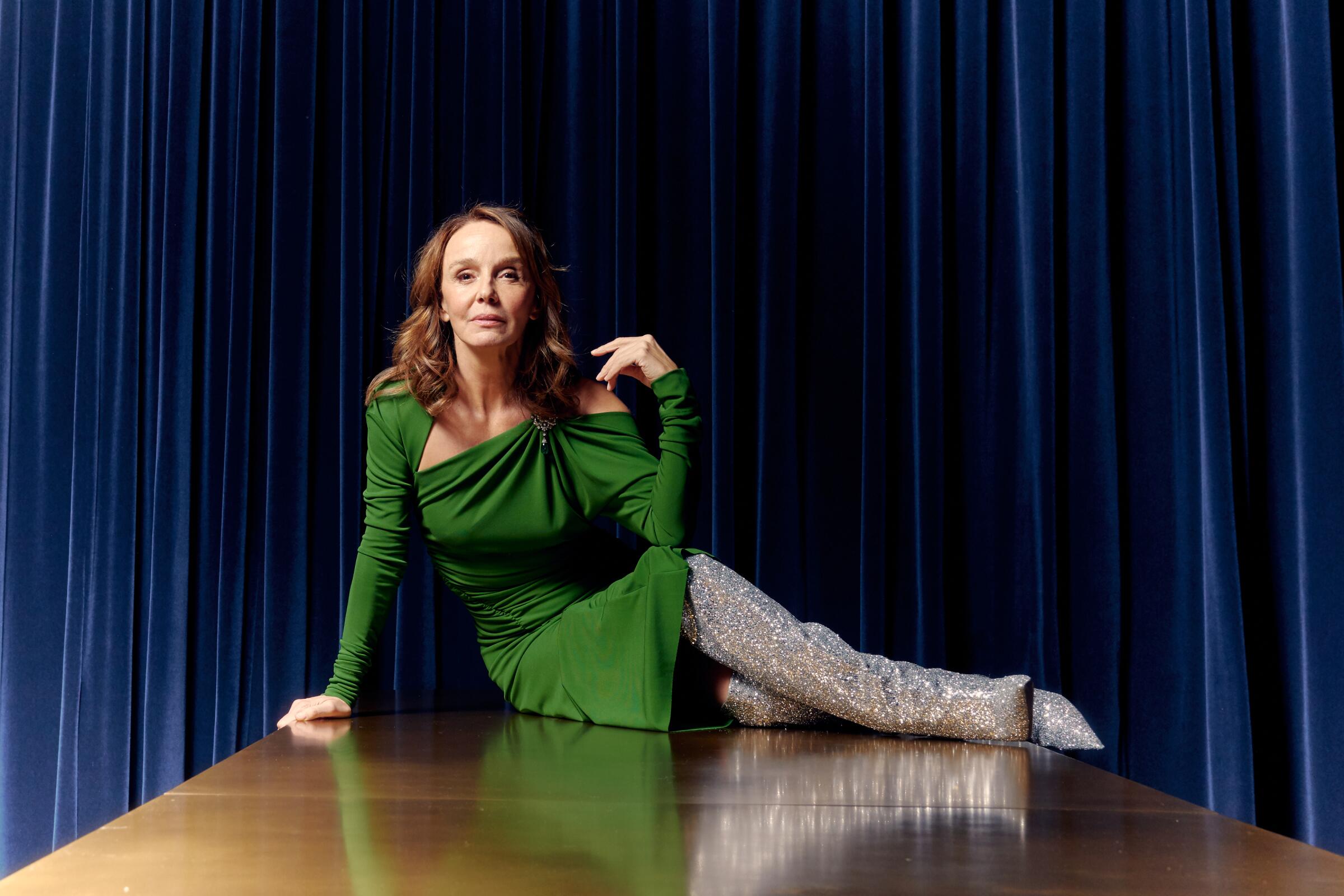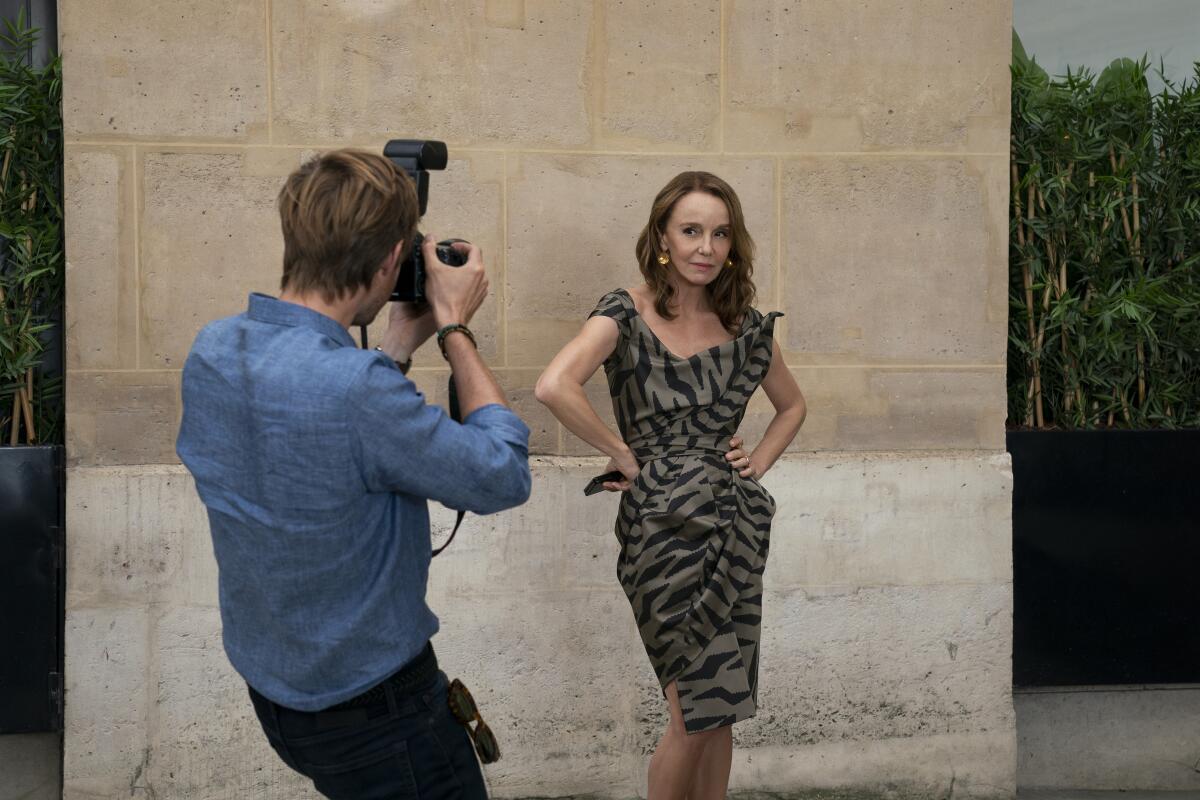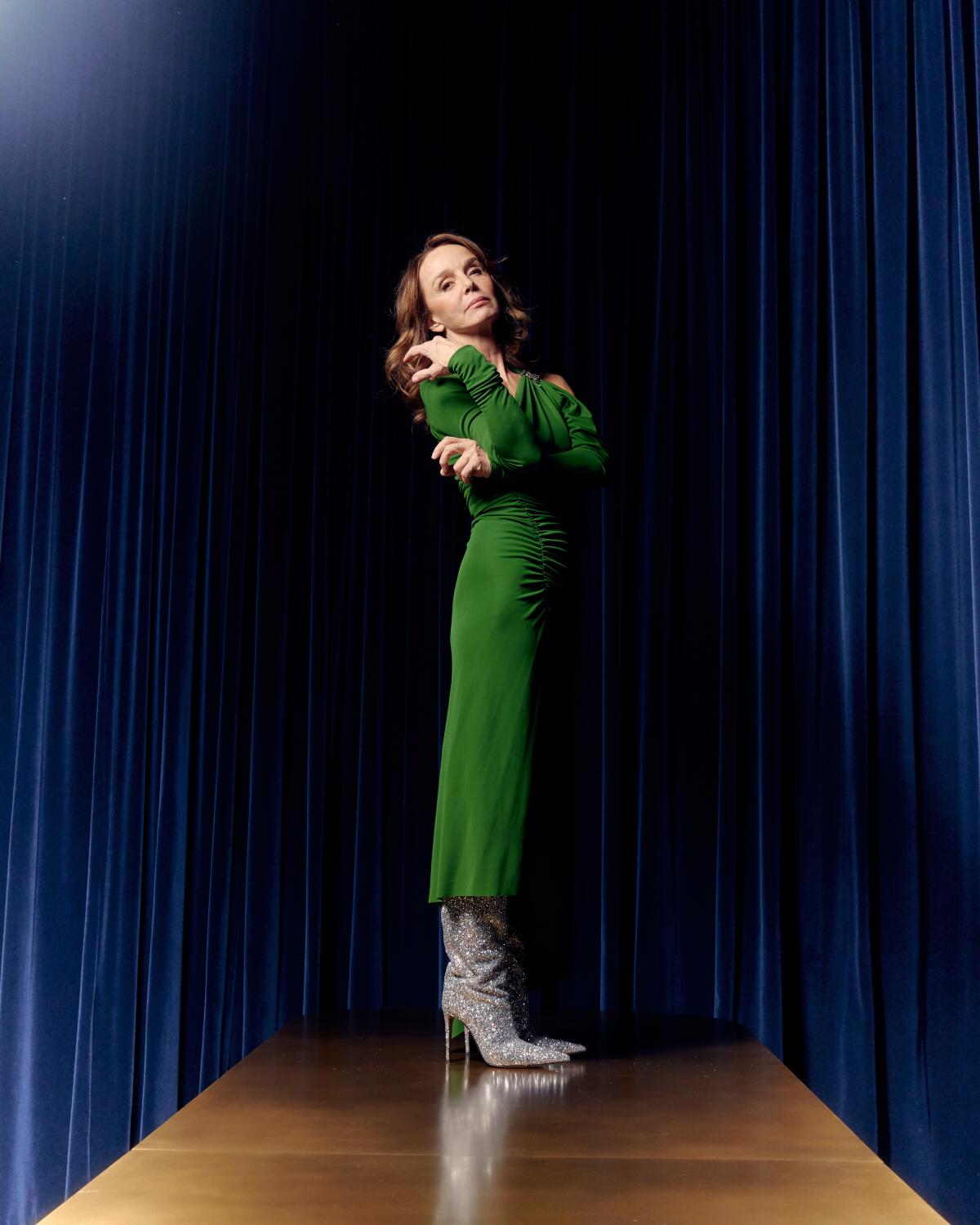The complete guide to home viewing
Get Screen Gab for everything about the TV shows and streaming movies everyone’s talking about.
You may occasionally receive promotional content from the Los Angeles Times.

There’s a moment early in the first season of “Emily in Paris,” Netflix’s colorful fish-out-of-water comedy about a bright-eyed American marketing executive abroad, when our protagonist‘s frosty, intimidating, effortlessly chic Parisian boss, Sylvie Grateau, called out the heroine’s clichéd behavior — and arguably established herself as the show’s most interesting character.
“You come to Paris, you walk into my office and you don’t even bother to learn the language,” Sylvie, played by Philippine Leroy-Beaulieu, says to Emily. “You treat the city like it’s your amusement park. And after a year of food, sex, wine and maybe some culture, you’ll go back to where you came from.”
Sylvie is definitely not always the boss you want to have, but with Leroy-Beaulieu’s finesse, the layers underneath her cool facade have made her a compelling, if somewhat inscrutable, antagonist. Armed with a raised eyebrow of judgment that can single-handedly deflate American cheerfulness, Sylvie struts around Paris in slitted skirts, plunging necklines and sky-high heels, embodying the sophistication and blasé elegance of the ultimate Frenchwoman. She is feared and revered — but she is good at her job without losing her identity to it.
Sylvie, not Emily, is the character we wish we had the audacity to be.
And she comes into focus like never before in the show’s third season, premiering Wednesday on Netflix. The series left off with Sylvie unexpectedly resigning, along with faithful employees Luc and Julian, after clashing with her superior at Savoir, a prestigious French marketing firm bought by an American conglomerate. The new season follows Sylvie as she sets out to open her own luxury marketing firm, Agence Grateau.
As Leroy-Beaulieu explained from New York in a recent video call, she appreciated the development for its willingness to show the power of a woman of a certain age, and at a certain stage in her career, being unafraid to take risks. She was in that position herself when she auditioned for the role, originally written to be between 35 and 40 years old.
Darren Star, creator of Netflix’s “Emily in Paris,” reflects on a 30-year career that includes “Beverly Hills, 90210,” “Melrose Place” and “Sex and the City.”
“It’s very empowering to play somebody like Sylvie,” she says, “because it’s a fantastic exploration of your own courage, of your own stubbornness, of your own faith and life. Playing Sylvie really made me realize that I had some aspects of my personality I didn’t know I had, and it gave me much more confidence. I also saw my demons much more — I love shadow work, that’s something I adore, and that’s super interesting, because you can use your demons much more if you can keep them on a leash. It’s really made me grow intimately a lot.”
Even before Leroy-Beaulieu, 59, slips into a slinky emerald green dress and blindingly bedazzled thigh-high boots for a photo shoot, she brings high style to our Zoom call with a red velvet suit jacket and a leopard-print scarf. She is surprisingly genial, given the artful aloofness she projects in the series, and when she smiles, it doesn’t feel like her eyes are throwing daggers. When the conversation turns to her own culture shock visiting the U.S., she says she found the loneliness of L.A. most striking, as well as our penchant for big warehouse stores.
Wait. Has she set foot inside a Costco?
“Yes, I have,” she says. “And I don’t like it at all. There’s no story. I just went in and went, ‘Oh my God, where am I?’ Even in France, I don’t like like supermarkets.”
With her fan-favorite turn in “Emily in Paris,” Leroy-Beaulieu is one of the most recognizable French actors of the moment. She even had a small role earlier this year in Netflix’s Emmy winner “The Crown,” playing Monique Ritz, widow of hotelier Charles Ritz.
“I couldn’t believe that they offered me that,” she says. “It’s a really small part, but it’s such an honor and it was such a great scene. Peter Morgan, to me, is sort of modern Shakespeare. And when you’re on that set, you feel like you’re a little piece of something much bigger than you.”
It’s quite the career turnaround for an actor who was never all that concerned with achieving international fame.

Leroy-Beaulieu made her acting debut in Roger Vadim’s film “Surprise Party” in 1983 and a few years later earned a César nomination for most promising actress with her role as a single mother in the comedy “Trois Hommes et un Couffin,” a runaway hit in France that would eventually be remade in America as “Three Men and a Baby.” The majority of her career has been in France, where she has performed in a string of films and TV shows, but she was virtually unknown in the U.S. until recently. In particular, the actor credits “Call My Agent,” the popular comedy (streaming in the U.S. on Netflix) about film industry agents struggling to keep their business afloat and clients happy, with breathing new life into her career after it launched in 2015. In it, she features as Catherine Barneville, the scorned wife of the firm’s most senior agent, whose extramarital affairs prompt the breakdown of their marriage.
It’s the sort of character Leroy-Beaulieu now says she isn’t interested in playing anymore.
“She is totally not a Sylvie because she is a victim of something much more,” Leroy-Beaulieu says. “That was a character that brought pain. And today, I don’t want to be that character anymore. There’s something about the ‘victim’ [aspect] of Catherine that I don’t want to play anymore. I guess, never say never. Don’t get me wrong, I really liked her. She was endearing even though she was misunderstood.”
There’s more than meets the eye with Sylvie too. The hard edges that painted Sylvie as a harridan boss and villain of the series have steadily softened, though never dulled completely. She leans into happiness in her love life, albeit with complications, and viewers glimpse her dynamic with her mother. Seeing the value in the skills of Emily Cooper (Lily Collins), however much she’d hate to admit it, Sylvie even wants Emily to join her new firm.
“As the writer putting myself in the shoes of an audience member, I just wanted to know more about her,” says Darren Star, the show’s creator. “I wanted the character to have this sense of mystery about her. And I love that feeling of putting out some breadcrumbs and Philippine’s performance just makes you crane your neck and want to know more even if the character doesn’t allow herself to be known. With the third season, because we’re seeing her from the perspective of different characters on the show, not just Emily, I feel like we get to know her better.”
According to Collins, who describes Leroy-Beaulieu as having “Mother Earth energy” on set, it’s been an education to watch how her co-star adds dimensions to what could easily be a flat portrayal.
Netflix’s “Emily in Paris” returns “Sex and the City” creator Darren Star to the City of Light — and pays subtle homage to the earlier series’ romantic finale.

“It is really fascinating to watch her process in wanting to make, technically, the villain of the show, still empathetic, grounded, relatable, soft at times. Watching her ask questions throughout the season in order to create this 360-degree character that makes you feel all the feelings — it taught me a lot about creating well-rounded characters that come to life differently from what’s on the page. And it’s so funny because she is so different than her character; there’s a real warmth to Philippine that grounds Sylvie’s coolness,” Collins says.
Familiar with crafting complicated female characters through series like “Beverly Hills, 90210,” “Melrose Place” and “Younger,” Star is quick to say Sylvie is not a villain, but rather a role model: “In terms of how she sees life and her point of view,” he says. “I never think of her character as a villain. She’s difficult as far as the relationship with Emily’s concerned. Emily is constantly trying to rise to the level of Sylvie. I think Emily’s fascinated by Sylvie and I think by extension, so is the audience.”
As Collins put it, Sylvie “brings out something completely different in my character than my other co-stars do just by the nature of their relationship.” Despite the cultural gap and generational divide, they are mirrors of each other.
“Sylvie recognizes Emily’s talent right away and that’s why she’s scared,” Leroy-Beaulieu says. “She sees how bold and smart she is and she recognizes that as something that she probably was when she was younger, in her own time, with different tools. But Sylvie knows that she was the one that opened all these doors for women like Emily to be able to walk through them. It’s not really in the story, but it’s somewhere. It’s a meta thing.”
Has she felt that in her own career — the fear of the next generation coming up behind her?
“Yes, I have felt it,” she says. “There’s something about getting older and working in these businesses where we’re so exposed — it’s very tricky. So I am trying to find a way not to fall into traps that are laid out in that path. And so far, I feel kind of safe. I haven’t fallen into the trap. It’s really horrible to feel bitterness; you don’t want to be jealous of the younger generation.”

She’s been acutely aware of the image-obsessed nature of the artistic worlds since childhood.
Her father, Philippe Leroy, was a well-known French actor who worked extensively in Italian cinema; her mother, Francoise Laurent, was an interior designer who later forged a career designing jewelry, handbags, scarves and knitwear for Dior. Though she was born in Paris, Leroy-Beaulieu was mostly raised in Rome, until she moved back to Paris as a teenager (with her mother and brother) after her parents’ divorce.
“I realized really, really young how the other kids were acting weird with me,” she says. “I’d be having lunch with my dad and I couldn’t talk to him because all these people were coming and asking for an autograph. I did know that it was not normal, it was different. But also I had parents that were very free and the house was full of very different people. And that not-normal [life] was also a lot of fun because it taught me a lot about a certain freedom.”
The complete guide to home viewing
Get Screen Gab for everything about the TV shows and streaming movies everyone’s talking about.
You may occasionally receive promotional content from the Los Angeles Times.
She drew inspiration for Sylvie from her late mother and the fashion world she orbited. And while she insists that she’s typically prone to wearing T-shirt, jeans and boots, she enjoys playing in Sylvie’s enviable closet — and analyzing how the wardrobe reflects the character. She says there were discussions about charting Sylvie’s evolution this season by adding more colors to her typically understated palette of black, olive, and biscuit while Emily brings a little refinement to her dizzying ensembles.
“We don’t say, ‘We are going to do a fitting,’ we say, ‘Let’s go to the lab,” Marylin Fitoussi, the show’s costume designer, says of her collaboration with Leroy-Beaulieu. “I proposed [the idea of] a mirror game effect. That means Philippine as Sylvie, watching this arrogant little girl from Chicago using [such] bold color, now goes, ‘Oh, it’s not so bad to be in color a little bit.’ It’s a statement, it’s powerful.”
“The important thing for me [with the clothes] is to remember where Sylvie comes from,” Leroy-Beaulieu says. “She comes from the south. She was a girl that was basically living bare feet on the beach and then she has to go to Paris and become Sylvie Grateau. So what I thought was, ‘OK, I need to remember that all the time. Let’s put on shoes that hurt me, so that I can always feel that pain. Or belts that feel really tight. She’s never really comfortable.”
But three seasons in, she’s learned the fun of playing Sylvie is in letting go.
“She’s so multifaceted and she expresses all these different sides of her with a lot of freedom,” Leroy-Beaulieu says. “Something Darren said, during Season 3, we’re shooting in the lavender fields, and he said, ‘You know what we can learn from French women? Freedom.’ And I thought, ‘I see where he’s going with that.’ There’s something about ‘I am who I am,’ ‘I don’t take any BS,’ ‘I don’t care how people judge me,’ ‘I’m just carrying on with my own life and my own goals and beliefs.’ Sylvie, she knows who she is. She does something in Season 3 that really could mean the end of her career towards the end of the season, but she does it with such confidence. I love that. It feeds me a lot.”
‘Emily in Paris’
Streaming: Netflix, any time
Rating: TV-MA (may be unsuitable for children under the age of 17 with advisories for smoking, nudity and coarse language)
The complete guide to home viewing
Get Screen Gab for everything about the TV shows and streaming movies everyone’s talking about.
You may occasionally receive promotional content from the Los Angeles Times.